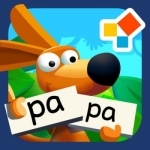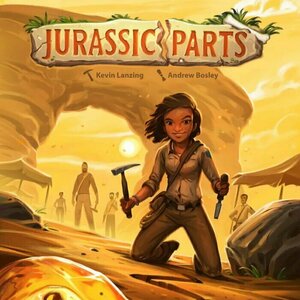
First Words Book and Kids Puzzles Box Free
Games and Education
App
“First Words Book and Kids Puzzles Box” is an educational app for the iPad that includes two...

Le bonheur de lire dès 3 ans: les fondements de la lecture en maternelle
Education and Games
App
RENCH ONLY ‘Le bonheur de lire’ offers a fun and catchy gameplay. The child is immersed in a...

Mantou Chinese-Korean Dictionary - DioDict 3
Reference and Education
App
▶All NEW DioDict 3 for iPhone!◀ --Dictionary features include-- Mantou Chinese – Korean...

Disorderly Conduct: The Academy
Book
You don't know what you've got until it's gone...Police academy cadet Charlie Burns can't believe...

Would Be King
Book
A dare turns into so much more... All I want to do is get to work on time. But a Prince Harry...
Purple Phoenix Games (2266 KP) rated Jurassic Parts in Tabletop Games
May 31, 2021
Jurassic Parts is an interesting mix and spins of area control, enclosure, and set collection for two to five players. In it, players are all paleontologists bent on claiming the biggest and best bones from a giant slab of rock containing dozens of dino species. The catch? Each paleontologist is trying to claim the bones for themselves. Sharp wit, good luck, and a bevvy of sharpened chisels spells success and fame for the paleontologist who wins at collecting Jurassic Parts.
DISCLAIMER: We were provided a copy of this game for the purposes of this review. This is a retail copy of the game, so what you see in these photos is exactly what would be received in your box. I do not intend to cover every single rule included in the rulebook, but will describe the overall game flow and major rule set so that our readers may get a sense of how the game plays. For more in depth rules, you may purchase a copy online or from your FLGS. -T
To setup, set aside one of the Pile of Bones (a wild card, of which there are several in the game) and shuffle the rest of the tiles. Split them into two stacks, flip one stack face-down, and build a slab around the Pile of Bones set aside earlier. This creates the slab of rock the players will be splitting. Each player receives their choice of paleontologist character sheet, chisels in their chosen color, and any pre-start resources per the rulebook. The slab is now ready for splitting!
On a turn, the active player will have several options. Firstly, however, the player must sharpen three chisels by moving them from the Dull Chisels are on the right of their sheet to the Sharp Chisels area on the left. Now the player may place their chisels anywhere on the slab, as long as it is on the gap between two tiles. The purpose of this is to create a wonky line of chisels that will break off sections of the slab from the larger chunk. Players will need to beware of rock piles on either side of their preferred placement, as each rock icon on either side of the placement will require an extra chisel to be dulled and discarded. If a chisel placement would cause a line to be completed, a hunk of the slab is separated from the master slab. Players consult with the line of chisels (as shown below) to determine which player has contributed more to the split than the others. This will rank out all contributing players. The player with the most chisels contributed will be able to claim their choice of HALF of the tiles split off, rounded UP (so a player would receive five tiles from a nine-tile split). The next player in contribution order will then have their choice of HALF of the remaining tiles, rounded UP (so the second player would receive two tiles from the previous example, as there would be four left). Subsequent players would then receive HALF of what is left until all tiles have been claimed, or there remains just one tile. This final tile is then given to the Field Leader for his collection.
In addition to this splitting and claiming on a turn, the active player may also make transactions with the Field Leader at any point during their turn. Actions that can be taken while transacting with the Field Leader are selling one tile to him in exchange for an Amber piece, spending Amber to: ignore rocks on the subsequent two chisel placements, sharpen two additional chisels this turn, take any of the leftover fossil tiles from the Field Leader, or take any fossil tile from the slab (as long as it doesn’t create a split). The first action from the Field Leader will cost the player one Amber. Should they wish to enact another action, its cost is two Amber. Subsequent actions on the same turn cost three Amber each.
As you will notice, fossil tiles from the slab will show plant fossils, Pile of Bones (wild), or actual bones belonging to specific dinosaurs. These specific bones will show an alphabetic letter pair icon to denote to which dinosaur it belongs. If, at the end of the game, players are able to assemble the correct type of fossil tiles belonging to specific dinosaurs, they will score many more points than if the dino skeleton were incomplete. For example, at the end of the game, each fossil tile is worth 1VP if from an incomplete skeleton. However, should a player have completed a Velociraptor skeleton, they will receive 4VP for those two tiles. A completed Triceratops scores 7VP, a T-Rex scores 10VP, a Brachiosaurus scores 15VP, and a tiny Pterodactyl scores 1VP for a complete skeleton because it spans only one tile. The Pile of Bones tiles in the game can be used in place of any other fossil tile to complete a skeleton, and Plant tiles score increasingly more points for a larger collection of them.
Play continues in this fashion of sharpening and placing chisels, breaking off sections of the slab and claiming fossil tiles, and utilizing actions at the Field Leader until all slab tiles have been assigned. The player with the most points from complete and incomplete skeletons and plants will be crowned the winner and the greatest paleontologist in the land… until the next playthrough.
Components. You know how you come to expect certain things from publishers, and can just imagine the quality of the game you are about to receive before seeing it? Such is the case with 25th Century Games. I KNOW that I will be receiving a quality product every time, and this certainly is no exception. The fossil tiles are great and sturdy. The chisels are neatly-designed and multifaceted (which I appreciate, as it would be easy to include tubular chisels and have them rolling around the table everywhere). The amber bits are the typical gemstones you find in Century: Golem Edition, but are the absolute PERFECT color and usage for this game. And did you see that first player marker? It’s a mosquito inside a polished amber stone. I mean, COME ON! How perfect is that? I’m excited just TALKING about the components. I haven’t even touched on art yet, and this is longer than most of my components paragraphs. The art is fabulous. It fits the game and the theme so perfectly – I could not have chosen a better fit myself. Has 25th Century Games set the bar too high for themselves, or will they continue to offer high quality games from here on out? I cannot wait to find out!
So sure, it looks great, but what about the gameplay? Do the art and components merely shield a mediocre game? No. Not at all. Being able to place chisels anywhere you like on the board offers players a freedom that is refreshing, but weighing that against the pressure to contribute to an existing or emerging line of chisels so that you are included in the split is just wonderful. Contemplating turns to sell off fossil tiles in order to earn enough amber to gain more chisels, or bypass rocks, or simply take the perfect tile for your collection offers just enough tacticization (why isn’t that a word…) to warm up the brain without indulging the AP in some players.
This is not at all a heavy game, and it certainly doesn’t need to be. It is just a fun time with friends and family that utilizes interesting twists of mechanics that I enjoy. It feels reminiscent of several games (hints of Through the Desert and a twist on I Split You Choose), but it entirely its own design. Purple Phoenix Games gives this one very rewarding 10 / 12. I generally enjoy most dinosaur-themed games, I understand, but this one sits among the best I have played. If you are looking for something that feels both familiar and fresh, with incredible art and components, you need to grab a copy of Jurassic Parts. There are just so many interesting choices to be made and strategies to attempt. I think I will setup a game right now. Want to come play?

